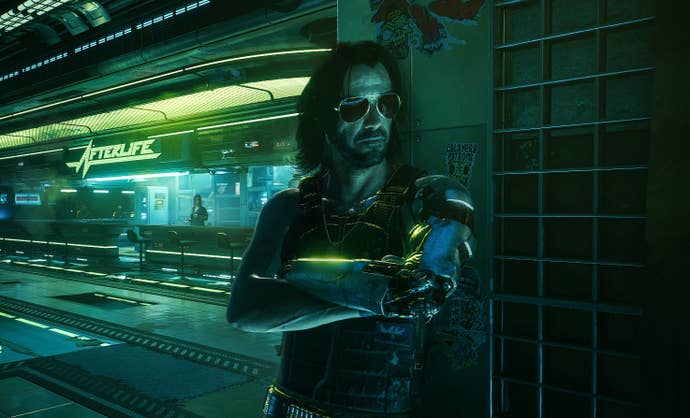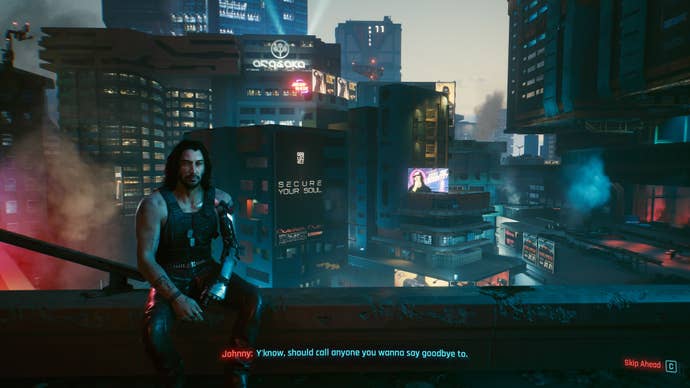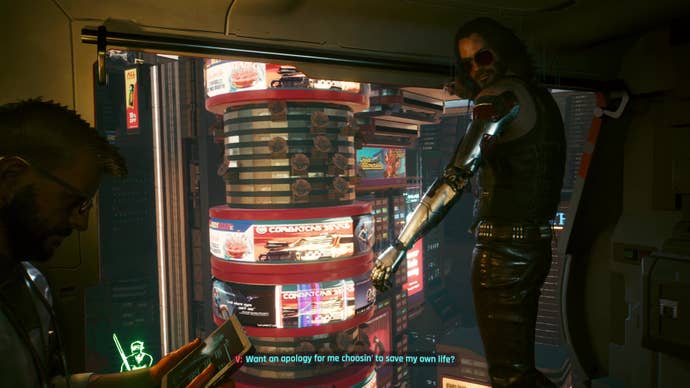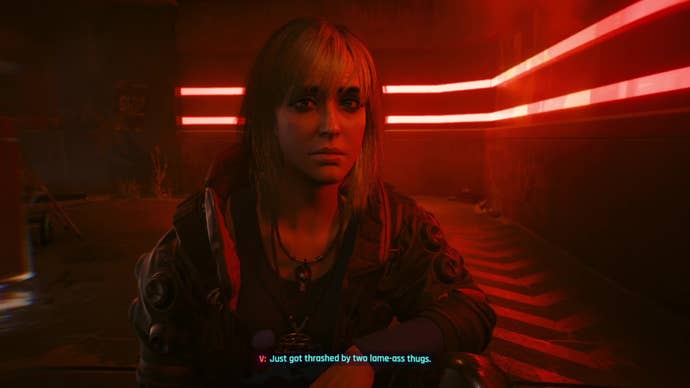[ad_1]
This article will contain top-level spoilers for all of Cyberpunk 2077’s various endings, including the new ending that can be unlocked via the Phantom Liberty DLC. You have been warned.
In Night City, there are no happy endings. Early on, this is posited as an absolute truth in this universe. Everything has a cost – and seldom is that cost cheap. In the menus of Cyberpunk 2077, one of three deliberately mysterious ‘completion percentages’ ticks up towards protagonist V’s goal of becoming a legend. But that goal is, in many ways, incompatible with life. From the earliest moments of this narrative, the choice is outlined plainly: for joy, there must be death.
Fixer Dexter DeShawn even says this out loud during the build-up to the heist that serves as the climax of Cyberpunk’s excellent, protracted prologue. “Would you rather live in peace as Miss Nobody – die ripe, old, and smellin’ slightly of urine? Or go down for all times in a blaze of glory, smellin’ near like posies, ’thout seein’ your thirtieth?”
This thread runs right through Cyberpunk 2077. It is its lifeblood, in fact. Many major and side quests focus on the concept that in Night City you can be somebody for a short time, or a nobody forever. For V, with the personality of one of Night City’s most infamous somebodies eating away at their brain, there isn’t much choice. Death is coming anyway. Which is all well and good – stalking the streets as a nobody wouldn’t make a very good video game. Nevertheless, there is a glorious contradiction in V’s desires.
For the lion’s share of Cyberpunk 2077’s run-time, V is driven by two desires. The first is as mentioned: to become a city legend through fanciful feats in its underworld. The second is a baser desire: to find a way to simply survive the inexorable march of Johnny Silverhand’s identity into their psyche. It won’t kill V’s physical form – but eventually Johnny will overtake them, erasing the person they once were, supplanting their mind – and perhaps even their soul, if such a thing exists – with that of the terrorist rocker.

This paradigm is arguably the thing that makes V one of the most compelling and successful choice-driven audience-insert characters in gaming history. Their desires are less complicated than, say, Mass Effect’s Shepard, who wants to save the galaxy but can also make some truly boneheaded decisions that work against their goals in order to ensure the player can be a space asshole. The stakes in Cyberpunk are more personal; will V be collaborative with Johnny as the two share a headspace, or combative? Both make sense, depending on how you envision the mindset of your V, and there’s next to none of that odd choice-related cognitive dissonance.
The contradiction, of course, is that V is repeatedly told that becoming a legend involves burning out. Blaze of Glory, just like Dexter said. The man in their head even wrote about this in one of his songs, a track that repeats on Night City’s radio stations and is strummed by guitarists on its backstreets: ‘Never Fade Away’. Burn out, instead.
Come the climax of Cyberpunk 2077’s story, V will be faced with final choices about what to do about their predicament – or, as you’ll have likely come to think of it, their and Johnny’s shared predicament. They sit on a rooftop together overlooking the neon city in a beautiful scene and run down the choices.

The exact options you have will depend on how you’ve spent your time in Night City. V might’ve truly touched the cusp of that desired legendary status. They might’ve fallen in love. Other relationships will almost inevitably have shattered apart. You can call lovers to say goodbye; allies to request aid. If you’ve made certain choices in Phantom Liberty, a DLC-exclusive friend can offer game-changing assistance. Even your relationship with Johnny comes into it – where if you’ve been kind and sympathetic to the voice in your head, he might offer up a suggestion of his own.
These different pathways result in a range of possible final missions and endings for both V and Johnny. This is where Cyberpunk 2077 is particularly brilliant, and Phantom Liberty brave: none of them are strictly happy endings.
For a start, V and Johnny can simply choose to end their conjoined life there on that rooftop, leaving business unfinished and friends devastated. Either through sheer brute force or through partnering with the bad guys V can excise Johnny from their psyche – but then is only given months to live, and live with the knowledge that they ultimately killed the last vestige of a man they – and the player – have likely come to quite like. V can surrender their body to Johnny – essentially dying, leaving a bittersweet Johnny to start a new life while V’s acquaintances are left shattered by their loss.
There are a few lovely variations of these endings depending on who you’ve befriended and how you reach the end, but this is the ultimate choice: V can live on for a limited time without Johnny, or die so Johnny can live. There is no scenario where everybody wins.

The easy, cheap, shitty thing for Phantom Liberty to do would’ve been to give a happy ending there; to lock the cheeriest finale behind the DLC expansion. But the game wisely sticks to its guns, its theme, and its subtext. In this dark future, there are no happy endings. Here, V can rip Johnny from their head and keep on living – but the cost is brutal.
Firstly, V and Johnny are denied their triumphant final revenge on the sinister corporation responsible for their dilemma. The legend of Johnny and V just abruptly stops, in fact – disappeared from the city to undergo a miracle cure. Waking up two years later from a coma, V’s friends have either moved on, or won’t forgive them for disappearing. Worse, rebuilding their life will be impossible. A side effect of the cure means that V can no longer tolerate cyberware – the futuristic tech that makes high-flying life in Night City possible. If you make the choice that’ll allow V to keep living… they will, in a miserable existence as another of Night City’s faceless drones. The final shots of this new ending are of a broken V – stripped of everything that made them V – disappearing into the bustle of the city. Just another face in the crowd. Dexter’s choice comes back around: V can live out their days… as Miss-or-Mr Nobody.

I really appreciate this about Cyberpunk 2077. Now, make no mistake: sad times and bad endings are something of a genre staple. But in a big, loud, brash triple-A video game like this, it’d be easy to chicken out.
To come back around to Mass Effect as a counterpoint, it’s something I always found vaguely frustrating about those games – I wish they’d have made me make more hard choices. But In Mass Effect, there was always a way out – you just needed enough war assets, or paragon points, or the right party members at the right time. Up until literally the last moment, Shepard can have it all. The ultimate power fantasy.
Cyberpunk puts forth a different argument: that power comes with a cost. V constantly has power – over others, over aspects of their own destiny, and even over the greater geopolitical state of Night City itself. But ultimately, that power leads to a life beset with impossible choices, punctuated quest after quest – and then driven home with a suite of endings that are always a wonderful, damning gut punch.
It also bravely leaves us without the obvious sequel bait: one way or another, V’s story is over. But the allure of Night City and Cyberpunk’s dark future remains, potent as ever. There are more stories to tell – but with fresh faces, untainted by the terrible realization of what this world does to people.

This is all the result of some brave choices – but also of truly treating the source material with respect and reverence. The tabletop game is also infused with the same soulful-yet-nihilistic energy, summed up in the words of its creator, Mike Pondsmith. “Cyberpunk isn’t about saving humanity – it’s about saving yourself.”
The deft way in which Cyberpunk 2077 handles its endings is one of several elements of the game that flew unceremoniously under the radar upon its initial release, as discourse focused on the title’s myriad troubles. But as it undergoes a rejuvenation and reevaluation, the endings now deserve to be appraised as they are: as brilliant, strong, and uncompromising – something games and big-budget mainstream entertainment now accomplishes far too infrequently.
[ad_2]